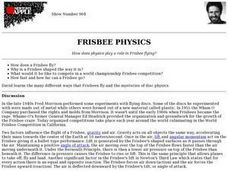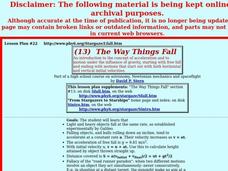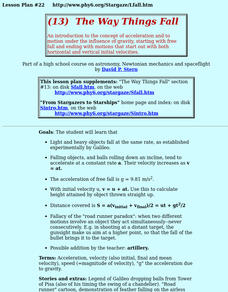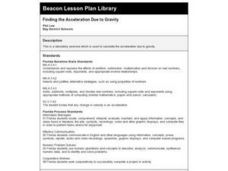Curated OER
Let's Think About... Magnets and Gravity
Students watch an episode of the PBS show "Jay Jay the Jet Plane," and explore magnets and gravity. They conduct various experiments involving magnets and sand, bean bags, and a fishing pole with magnets.
Curated OER
What's Out There? Space Shuttle Exploration and Simulation
Students role-play the jobs of space shuttle astronauts, conduct experiments, and research space using the Internet and offline experiments. Student-astronauts hold a "press conference" to share their information with others in a...
Curated OER
The Incredible Light Bulb-Egg Drop Challenge
Students examine how spacecraft land on Mars. Using eggs or lightbulbs, they design a craft that withstand a drop from a table or ladder, competing in groups to see which module demonstrates the most successful landing.
Curated OER
High Jump
High schoolers examine how physics help high jumpers break records. They discuss the phases of the high jump, gravity, and center of gravity, and conduct an experiment to determine whether they can improve the height of their jump.
Curated OER
Gravity and Erosion
Students examine how gravity affects erosion and deposition through teacher demonstation, and discuss its impact on their communities.
Curated OER
Frisbee Physics
Young scholars explain how a Frisbee flies, why it's shaped he way it is and how fast and how far the Frisbee can go.
Curated OER
The Way Things Fall
Students explore concept of acceleration and motion under the influence of gravity, starting with free fall and ending with motions that start out with both horizontal and vertical initial velocities.
Curated OER
When Push Comes to Crunch
Eighth graders engage in an experiment which uses an inclined plane and balls of various masses to determine the effect a large object has on a small object. They study velocity, momentum, gravity and forces.
Curated OER
Roll On
Second graders, in groups, develop models to show how forces such as gravity, friction, equal, unequal forces and change in direction work on marbles.
Curated OER
Balloon Rockets
Students build pinwheel airplanes and balloon rockets to determine which ones fly faster and which fly farther.
Curated OER
Working in Space
Students design and build one of three engineering problems dealing with living and working in space.
Curated OER
The Way Things Fall
Students see that light and heavy objects fall at the same rate, as established experimentally by Galileo. They see that falling objects, and balls rolling down an incline, tend to accelerate at a constant rate a. Their velocity...
Curated OER
Aerodynamics
Students discover the basic principles of aerodynamics, including the roles and identity of natural forces involved. They examine how the force of gravity is overcome by the curved shape of an airplane wing and air pressure.
Curated OER
Balancing Act: Olympics, Winter Sports, Ice Skating, Gravity, Physics, Science
Students, by way of the Olympic Games event of ice skating, are introduced to the concepts of gravity. They try some hands-on gravity experiments and explore the concept of gravity through art.
Curated OER
Finding Your Center of Gravity: Science, Math, Measurement, Math
Students use bathroom scales, rulers and boards to explore how to measure their own center of gravity.
Curated OER
Weightlessness
Students use a coffee cup to demonstrate weightlessness. After a lecture/demo, students read an article on free-fall. They perform a simple experiment which helps them explain the concept of weightlessness.
Curated OER
Black Hole Lesson
Tenth graders experiment with detection techniques for black holes by modeling the rotation of galaxies with larger and larger masses in the center. They discover while some events cannot be directly observed they may be observable in...
Curated OER
Center of Gravity Problem Set
Young scholars read a NASA Web-based text, then demonstrate an understanding of the text by using it to complete an activity on the center of gravity of a commercial cargo airplane.
Curated OER
How the force of air helps an airplane fly.
Students appropriately the following terms in sentences: drag, thrust, gravity, aerodynamics and lift.
Curated OER
Interactive Physics & Projectile Motion
Students explore projectile motion using an interactive program and the projectile launcher. In this physics lesson, students calculate a give projectile motion problem. They compare their answer to Interactive Physics' answer.
Curated OER
Get a Lift!
Students explain the principles of flight. In this physics instructional activity, students perform a series of exploration activity on Bernoulli's principle. They relate this principle to airplane flight.
Curated OER
Force Counterforce
Middle schoolers hypothesize what forces affect the motion of a falling body. In this physical science lesson, students create diagrams and illustrations to support their hypothesis. They perform the experiment and record observations.
Curated OER
Universal Gravitation
Students create a KWL chart about gravity. In this astronomy class, students investigate the nature of gravity. They discuss common misconceptions and address them.

























